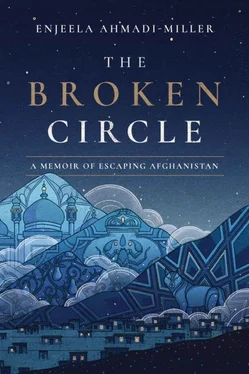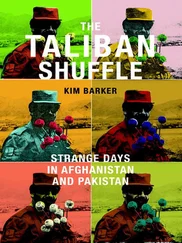Along with the other changes, strange men began coming to our house to speak to Padar about business. I used to stand in the hall just outside the visitors’ reception room until Noor came along and shooed me away. It was a room solely for entertaining guests. They smoked cigars, drank from small glasses, and talked business and about the fighting in the cities and about the army being called out to shoot their fellow Afghans.
A shift was happening faster than I could process. I thought that if I just kept doing the things I always did that life would return to normal, so on clear days I would escape to my favorite pear tree at the end of the driveway beside the gate. I sat up there, where I could see over the entire city. The government buildings down the street were large and new. The sky stretched out forever, a tight blue sheet that ran up to the tips of the snowcapped Hindu Kush mountains in the distance.
These pleasant days of my childhood in Kabul came to an end with a phone call from the countryside. I was in my sister Laila’s room with Zulaikha, sitting on the floor talking, when I heard Mommy lift the receiver in the coolness of the hallway and give her greeting, “Salaam.”
This afternoon, her voice didn’t have her usual confidence and command. Her hello cracked with hesitation, as if she had expected this call, and because it had finally come, it was unbearable to hear. She listened in silence for a long beat.
“What?” she said, her voice frantic. “Don’t do it. Don’t do it.” She kept screaming over and over again.
That Mommy would cry like that was a great shock. But that she had finally raised her anguished voice was not unexpected.
Laila and Zulaikha had just come home from school, and they were both dressed in their volleyball uniforms. The three of us were talking about Laila’s ambition to play volleyball in the Olympics. She was good, and she was motivated to practice hard. I believed every word of her dream. Women and girls were doing the most amazing things in those days in Kabul, opening businesses, becoming doctors and lawyers and other professionals, traveling on their own. Women were no longer cloistered behind the veil.
Our chattering stopped when Mommy shouted, “Don’t do it!”
Do what? My sisters and I looked at each other with mouths open.
“It’s her cousins,” Laila said. She knew them by name. I had seen them many times before, the last time at my sister’s engagement party. I recalled they had both had a petrified look when those Parcham men strutted into the party.
Ahmad Shah had explained to me that Parcham was a communist party that believed Afghanistan should have a socialist revolution in the same way Russia had their revolution. From the way Padar and Mommy spoke about them, I knew they were opposed to their socialist revolution, like so many others in Afghanistan. When the Parcham began their revolution, there had even been a great uprising in the city of Herat, where thousands of people had been killed by the army.
The receiver hit the marble floor with a hard thud. Laila, Zulaikha, and I rushed into the hall. We found Mommy on her knees with her hands covering her face, weeping. We had never seen this before. She was always so composed and self-assured. We never saw her without her hair neatly brushed and a fashionable outfit. But now her shoulders were heaving, and a cry of anguish seeped through her fingers.
Laila elbowed me. “Enjeela, go find Shapairi.”
Shapairi was our eldest sister now that Shahnaz had moved out. She would know what to do. I stared down at Mommy in frozen disbelief that she was capable of such emotion and anguish.
“Enjeela, go!” my sister shouted.
By the time I returned with Shapairi, Mommy was sitting up against the wall. She had wiped her tears and composed herself, but she wasn’t speaking to any of us. My older sisters pushed me out of the way as they talked to her in sympathetic whispers. Shapairi helped her up, and they both went into her room and closed the door. They didn’t come out the rest of the day or that evening for dinner.
When Padar arrived home from work, Shapairi told him what happened, and he disappeared into their bedroom. At dinner, Padar said only that she wasn’t feeling well. No one spoke about her crying earlier or the phone call. We carried on as we usually did, following all the same behaviors and rituals as on any other evening, just without Mommy. After dinner, we adhered to the custom of reciting a poem by heart. Padar gathered us. He knew almost all of Rumi and Hafiz by heart, and he pushed us to memorize them too. My sisters Laila and Zulaikha and Shapairi, and my brothers, Zia and Ahmad Shah, sometimes spoke out the lines in half-hearted ways, depending on their moods. But I loved poetry, and even though I was very young at the time, I had many of the poems completely memorized. Poems had this way of touching the deepest parts of me that gave me comfort. My favorite poem was written by the great poet Hafiz. Though I was the youngest to contribute to this family ritual (Vida was only three and couldn’t participate), I restlessly waited my turn to recite. It wouldn’t do for me to be half-hearted; I wanted more than ever to please Padar.
“Enjeela, recite,” Padar finally said to me, waving his hand. Padar had a most discerning and intelligent glare. He expected me to do well.
I stood erect before him and smoothed down my blouse. I took a breath, notched up my chin, and called it forth:
Within the Circle
The moon is most delighted when it is round
And the sun is the vision of a pure circle of gold
That had been refined and surfaced in flight by the creator’s lighthearted kiss
And the different kinds of fruits rounded to swing freely within the circle
From the branches, it appears the origin of a sculptor’s hands
And the pregnant belly curved and shaped by excellent of its kind by the soul within
And the plants and the round surface of the universe and Mother Earth itself
I have gotten the creator’s hint
There is something within the circle the creator loves
Within the circle of a perfect one
There is the Beloved’s endless community
Of Light
I understood that this circle encompassed the entire universe, which was far too large for me to comprehend. But this poem made it small enough for me to understand my place in it. God had put me in the wonderful city of Kabul, part of a nation of good people, and this was only a fragment of the giant circle of the Beloved. And inside that larger circle were spaces of kindness and love and hope with my brothers and sisters and parents. I was part of the circle of life, and I could rest in the gentle arms of the Beloved. I believed every word of that poem, that good things enveloped me as they had my parents and Shahnaz and her happy marriage. My life in Kabul wrapped around me, a full circle of love and hope.
Padar’s grin widened as I spoke, and a gleam of pleasure rose in his eyes. I knew he was pleased. He slouched in his wing chair, his legs crossed, his hand clutching a sweaty glass of Scotch and water. He nodded at my words, his searching gray eyes never leaving me as he took a sip. He wore a neatly trimmed mustache, and his lips twitched imperceptibly as he kept the rhythm of the words, as if he could feel their pulse.
Still in his suit, his tie barely loosened, he prodded us late into the evening to recite more poems while he drank his Scotch, only leaving the room to pour himself more. From the smell of it, he was drinking it straight now. Something had transpired that made him drink until his eyes were so glassy he wasn’t even aware of our presence, as if he were trying to forget something. Days later, Laila told me what she had learned from Shapairi about what had happened, what Mommy had heard on the other end of that phone call. Mommy’s favorite cousins had committed suicide. They had shot themselves shortly after the call with Mommy. The phone call had been their farewell. In my country, even in death, there is a certain courtesy family members maintain. It had been their choice to take their own lives rather than live without freedom.
Читать дальше












